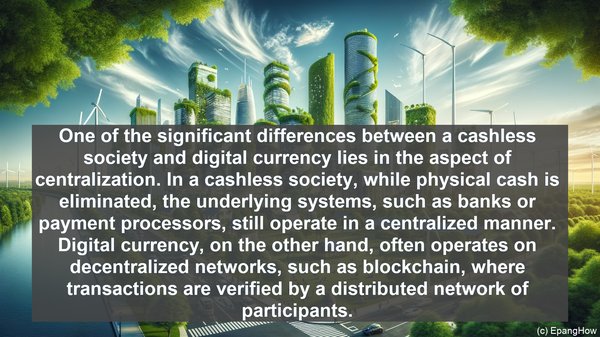Introduction: The Evolving Landscape of Transactions
Greetings, everyone! In today’s world, the way we handle transactions has undergone a significant transformation. Traditional cash transactions are gradually being replaced by digital alternatives. However, it’s crucial to understand that a cashless society and digital currency are not synonymous. Let’s explore the differences between these two concepts.

Defining a Cashless Society: Beyond Physical Currency
When we talk about a cashless society, we refer to an environment where physical cash is no longer the primary medium of exchange. Instead, transactions occur through electronic methods, such as cards, mobile wallets, or online transfers. The key aspect here is the absence of physical currency, with digital alternatives taking center stage.

Digital Currency: The Broad Spectrum
Digital currency, on the other hand, encompasses a wider range of assets. It includes not only the digital representations of traditional fiat currencies, like the digital dollar or euro, but also cryptocurrencies like Bitcoin or Ethereum. Digital currency is essentially any form of currency that exists purely in electronic or digital form.
The Role of Centralization: A Crucial Distinction
One of the significant differences between a cashless society and digital currency lies in the aspect of centralization. In a cashless society, while physical cash is eliminated, the underlying systems, such as banks or payment processors, still operate in a centralized manner. Digital currency, on the other hand, often operates on decentralized networks, such as blockchain, where transactions are verified by a distributed network of participants.
Privacy and Anonymity: Varying Degrees
In terms of privacy and anonymity, a cashless society may offer limited discretion. While individual transactions may not be publicly visible, the overall flow of funds can be monitored by financial institutions or authorities. Digital currencies, especially privacy-focused ones, can offer a higher degree of anonymity, with transactions being pseudonymous and less traceable.
Adoption and Accessibility: Considerations for Inclusion
For a cashless society to be fully realized, it requires widespread adoption and accessibility. This can pose challenges, especially in regions with limited digital infrastructure or populations without access to technology. Digital currencies, with their borderless nature and potential for financial inclusion, can bridge some of these gaps, offering an alternative to traditional banking systems.
